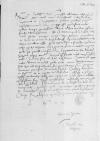Letter #640
Cornelis DE SCHEPPER to Ioannes DANTISCUSRegensburg, 1531-06-11
English register:
Yesterday night De Schepper arrived in Regensburg. He was informed by Captain of the city Christophorus Plarrer that the King of the Romans [Ferdinand] is in Prague. A conference held in Transylvania is being attended by Hieronim Łaski and Lodovico Gritti – envoys of the Polish King [Sigismund I] and of the Voivode [John Zápolya] - and Wilhelm von Rogendorf. De Schepper would like to be there, as far as his other assignments, which are of equal importance, allow it. For this, he depends upon the instructions of the King [Ferdinand].
The truce lasts until May 1. Meanwhile the Turks are preparing for war, while on their own side defeatism reigns.
He will write more extensively from Prague. He will leave immediately after hearing mass. He wants to cover the distance of 26 miles to Prague in two days, travelling on horseback. He sends greetings to [Alfonso de] Valdés and the Margrave [Johann Albrecht of Brandenburg].
| received Ghent (Gandavum), [1531]-06-30 Manuscript sources:
Auxiliary sources:
Prints:
| ||||||||||||
Text & apparatus & commentary Plain text Text & commentary Text & apparatus
Reverendissimo et excellentissimo Domino, domino
Reverendissime et excellentissime Domine.
Praemissa oblatione obsequiorum meorum.
Heri noctu veni
⌊vayvodanos
⌋ et dominum, ut putat,
Cum
Commenda me domino
Datae
Eiusdem Reverendissimae Dominationis Vestrae humilis inservitor
[1 ] Cf. Plenipotentia a rege Ioanne (Zapolya) data consiliariis ad tractandum cum consiliariis regis Ferdinandi de indutiis ac pace in: cf. Acta Tomiciana, vol. 13, ed. by Zygmunt Celichowski, Poznań, Biblioteka Kórnicka, 1915 ⌊AT 13cf. Acta Tomiciana, vol. 13, ed. by Zygmunt Celichowski, Poznań, Biblioteka Kórnicka, 1915 ⌋, No. 97, p. 95. The negotiations mentioned here were conducted from January 1531 in Prague, Cracow and Visegrád. They were concluded by the establishment of a one-year truce on May 17 in Visegrád (cf. cf. Acta Tomiciana, vol. 13, ed. by Zygmunt Celichowski, Poznań, Biblioteka Kórnicka, 1915 ⌊AT 13cf. Acta Tomiciana, vol. 13, ed. by Zygmunt Celichowski, Poznań, Biblioteka Kórnicka, 1915 ⌋, No. 27, p. 35-36, No. 211, p. 205; cf. Tadeusz Silnicki, Zjazd w Poznaniu w r. 1530, Poznań, 1933 ⌊SILNICKIcf. Tadeusz Silnicki, Zjazd w Poznaniu w r. 1530, Poznań, 1933 ⌋, p. 56; Silnicki, based on the source materials, published in cf. Österreichische Staatsverträge Bd. 9: Fürstentum Siebenbürgen (1526-1690), ed. by Roderich Gooss, Wien, Holzhausen, 1911 ⌊GOOScf. Österreichische Staatsverträge Bd. 9: Fürstentum Siebenbürgen (1526-1690), ed. by Roderich Gooss, Wien, Holzhausen, 1911 ⌋

